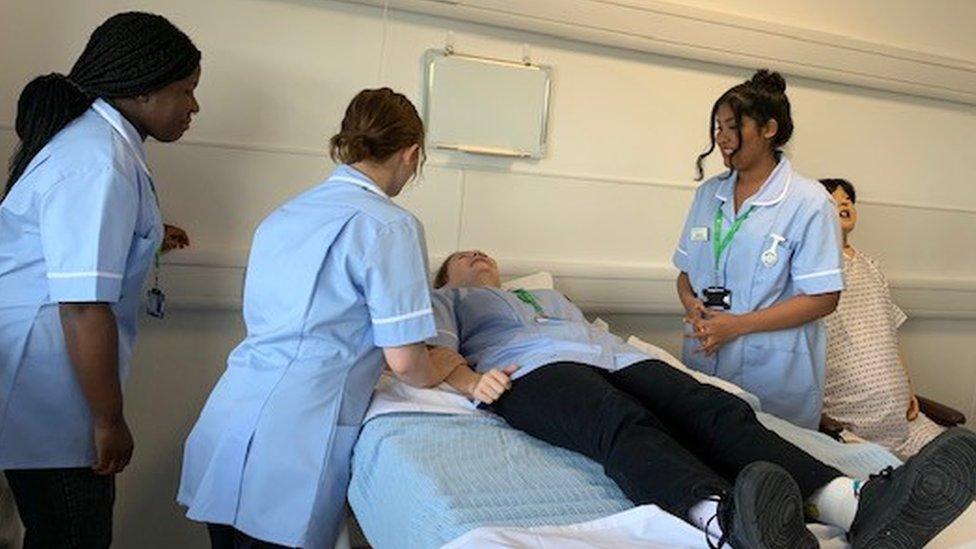Scrapping B-Tecs 'hammer blow for social mobility'
- Published

Health care students at Swindon College
A campaign to stop many BTec vocational qualifications being scrapped within two years has won the backing of MPs and Lords from across the parties.
Some 118 have written to Education Secretary Nadhim Zahawi asking him to re-think plans to use T-levels to replace them in England.
Peers voted on Tuesday to amend the Skills Bill to demand a four-year transition before funding is removed
The government said T-levels offer students a route to university or work.
'Risky scenario'
Although they are at the same level as BTecs, T-levels are different in their design and include a work placement, which college principals say reduces the time available to re-take core GCSEs such as maths and English.
Colleges offering T-levels are likely to make GCSEs in English and maths an entry requirement, which means colleges are unlikely to offer places to those who need to do re-takes.
If a student does not have the GCSE grades to do A-levels or Btecs, then the entry requirements for the new T-levels will mean they have fewer options.
The letter to Mr Zahawi is in support of the Protect Student Choice campaign by a coalition of education organisations including many colleges and universities.
Bill Watkins, chief executive of the Sixth Form Colleges Association, said the shake-up was far from "levelling up".
"This is a hammer blow for social mobility," he said.

College principal Graham Pennington worries that some students will not be able to advance in their careers
Graham Pennington, chief executive of Sandwell College Group - which presently offers A-levels, BTecs and T-levels - said if many BTecs are scrapped "possibly tens of thousands of young people would not have a clear route".
"They're going to find it very difficult to come to college and gain qualifications that will help them get further in their life.
"It's a very risky scenario," he added.
"Lots of young people will find themselves with no real pathway to fulfil their goals and dreams, and that's incredibly sad."
T-levels are the government's flagship new technical qualification being phased in over three or four years from 2020.
Designed with business, they require a minimum of 45 days of work placement.
Three were launched in 2020 and a further seven have started this term.
Students face a choice
Cadbury College in Kings Norton, Birmingham, offers students a choice of A-levels, BTecs or T-levels - which are equivalent to three A-levels.
Jess Cartmell is on a T-level childcare and education course at the college.
"I like the fact that it's something I definitely want to do and it will definitely take me to where I want to be," she said.
As well as learning about child development and childcare in college, Jess is spending two days a week on a placement in a nursery.
But she says she was unusual in knowing what she wanted to do at the age of 16.

T-level, A-level and B-Tec students at Cadbury College
"Less than half knew what they wanted to do, I think that's why most people chose BTecs and A-levels."
Yasna Rezael, who is doing two BTecs in Applied Science and Psychology, said: "At the beginning of the year I wasn't sure what I wanted to do, so I chose applied science which means I can have a variety of choices at university."
Within a couple of years most 16-year-olds in England will be asked to choose between traditional A-levels or T-levels.
'Range and quality'
The letter to Mr Zahawi has been signed by three former Education Secretaries - Lord Baker of Dorking, Baroness Morris of Yardley and Lord Blunkett.
They argue the move "will leave many students without a viable pathway after their GCSEs, particularly those from disadvantaged backgrounds".
They are concerned that "removing the vast majority of BTecs will lead to students taking courses that do not meet their needs, or dropping out of education altogether".
Higher and further education minister Michelle Donelan said the government would ensure there was a good range of high quality courses.
She said: "T-levels are a route to university. They are a highly academic courses that focus on on certain skill levels and they're going to be highly respected not just by business, but by universities.
"We will ensure there's a good range of courses overall and ensure there is quality."
Related topics
- Published29 July 2021
